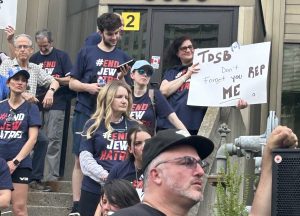 “I swore never to be silent whenever and wherever human beings endure suffering and humiliation… Silence encourages the tormentor, never the tormented.”
“I swore never to be silent whenever and wherever human beings endure suffering and humiliation… Silence encourages the tormentor, never the tormented.”
From left are Holocaust survivor Olga Sher, Kortney Shapiro and her grandmother, Vera Gold, at Hillel Montreal’s annual Shabbat dinner.
These are the words of writer, political activist and Holocaust survivor Elie Wiesel. I chose them for my opening remarks at Hillel Montreal’s annual Shabbat dinner this past October, which celebrated the lives of Holocaust survivors.
My generation is likely the last to hear Holocaust survivors’ experiences first-hand. Samuel Willenberg and Kalman Taigman, for example, are believed to be the last two survivors from the extermination camp Treblinka. The men are dedicating their remaining years to trying to preserve the memory of the 875,000 victims who were murdered at the camp.
With each moment that passes, the survivors’ personal accounts and memories become our responsibility to tell, otherwise they will disappear forever. If we do not listen and relay their testimonies, we won’t be able to carry on their legacy.
Hillel students in Montreal hosted more than 200 people at Beth Israel Beth Aaron Synagogue in Côte Saint-Luc, including 30 Holocaust survivors, at the Shabbat dinner.
My grandmother, Vera Gold, was among the group of survivors present at the dinner. This was her fourth year coming to Montreal in support of Holocaust Education Week. “What amazes me is that you started something very small at the Hillel House and it grew into something really unbelievable,” she said.
Hanna, a McGill University student, said that the “Holocaust is not a topic often brought up in [my] house, so having had the opportunity to sit down and speak with a survivor at my table, feeling comfortable enough to share my family’s story and [then] hearing his story was a really emotional and special moment for me.”
In November 2007, at the final event of the McGill Holocaust Education Week, my team and I hosted the annual generational Shabbat dinner at the Jack Reitman Hillel House. Seventy-five people attended, most of whom were students, along with six survivors. My grandmother was one of the survivors who told her story of survival at the Ravensbrück and Sered concentration camps.
Last year our numbers for the dinner grew to more than 200. With that increase, we were able to host the dinner in a banquet hall on McGill campus. More than 15 survivors were present, along with a group of Righteous Among the Nations.
Among the other guests was Ewa Junczyk-Ziomecka, who is now the Polish consul general in New York, as well as representatives from the Museum of the History of Polish Jews in Poland. Some of the survivors brought books, photographs and testimonies to give to students, and stories and memories were exchanged over a warm Shabbat meal.
Having 30 Holocaust survivors present at this year’s dinner was truly remarkable. The room was like a heartbeat, pulsating with conversation that extended late into the evening.
Olga Sher, a survivor living in Montreal, has attended the Hillel Shabbat dinner for the last three years, after having told her story during a program for McGill Holocaust Education Week in 2008.
This was McGill student Tiana’s second year at the dinner. “As an individual not of the Jewish faith, I can’t stress how much the Holocaust needs not only to be remembered, but also taught,” she said.
“Genocide has no culture, race, nationality or religion. What really hit home for me during the dinner was when Rabbi [Reuven Poupko] was speaking of the heartbreaking code of silence that suppresses people to speak out against atrocities.”
After a week of programs and events, including film screenings and the fourth annual Reading of the Names of Holocaust Victims on campus, the Shabbat dinner was a fitting conclusion to the entire week.
The statement “never forget, never again,” which has become a cliché for many, is now more important than ever in keeping survivors voices alive.
We are the voices of tomorrow and the makers of change. We are able to study the Holocaust from first-hand experiences, and not from a textbook. Our inheritance is the survivors’ legacy.
Kortney Shapiro is a fourth-year McGill University student and co-director of a CFJS Holocaust education and genocide awareness initiative.






